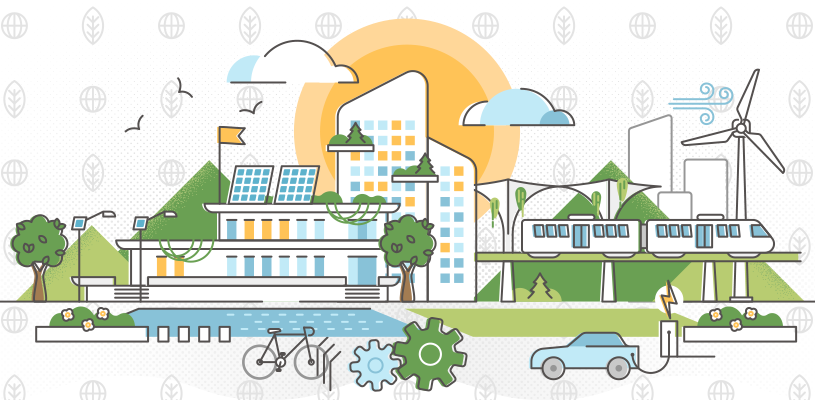Connection redefined: A new way of building resiliency

The pace at which cities function is moving at a remarkable rate. New buildings, new parks, new technologies, and new disruptions are challenging how we build and navigate our city systems.
In fact, from the time this article is written to the moment it is read, so much may have changed.
We’ve seen how challenges – like global pandemics – can sweep across borders with tremendous effects on the everyday lives of individual residents. During these extraordinary times, the most pressing issues that communities once faced – affordable housing, urban resiliency, mental health, transit, and access to green space – become even more amplified. For most of us, these are challenges that we have never before witnessed in our lifetime.
Yet, at these critical moments, when it’s more important than ever to connect to solve these complex issues, the mere action of connecting is the challenge in itself.
How can we adapt to make decisions in a world moving so quickly? As communities, how can we do this collaboratively when we are now more physically apart? Who gets to make the big decisions? And how can we come together to advance the right decisions and create solutions more confidently to improve the quality of life for all?
Unlikely Connections to Accelerate Change
As the world moved at varying paces over recent months to address how to contain the spread of COVID-19, it became clear that the best answers emerged when looking at – and listening – to each other. Face-to-face or virtually, we saw municipal and community leaders, the private and public sectors, and residents demonstrate the power of connectivity to bring positive change and calm at time of uncertainty.
We recall how distilleries converted production to create hand sanitizers, hotels provided accommodation to the homeless and vulnerable, and car manufacturers re-tooled to build medical equipment. The Canadian tech community continues to adapt to tackle and recover from the outbreak with a growing list of initiatives and platforms to help communities and their residents share the right information and to do so more quickly.
For municipalities, short-term actions are critical and must focus on supporting first and foremost the health and well-being of those who are most vulnerable and those on the frontlines who are taking extraordinary actions for community benefit. But it is equally important to adjust now to the longer-term shifts that will play out as result of recent events. The next year will be pivotal for municipalities to rethink, redesign, and rebuild how they deliver programs and services.
While communities respond to crisis in different ways, adapted to their own local circumstances, worldwide we watched as travel halted and borders closed. Here in Canada, we’ve seen a long list of national conferences postponed, regional workshops cancelled, and workforces adjusting to virtual meetings. Much of the workforce retreated to their homes, adhering to a now-familiar concept of social distancing and self-isolation.
It’s hard to imagine a world where platforms can replace in-person connections. The challenge is how to create real connections during this new reality?
Power of Shared Experience
We can take comfort and inspiration in that this is a shared experience and that all sectors are tasked to re-evaluate how we live, work, play – and connect with each other.
We know that moving every bold idea into action takes connection. Partnerships have been at the core of our work for the last 30 years. Whether it’s gathering community members in a local park to reimagine a public space or convening urban innovators to accelerate change in cities at an international summit, creating meaningful relationships is critical to advance positive change. We know that these connections must be across sectors and across the county to make sense of the now, the possible futures, and ultimately the preferred future we all want.
We know first-hand that the energy in the room is what fuels solutions forward. It’s when sectors connect and work together to co-design solutions. It’s often the hands-on smaller break-out sessions and activations that provide the inspiration, optimism and tools needed as communities work towards an equitable and sustainable future. That act of connecting is what will propel forward the ideas and partnerships that will have impact now and in the far future.
Connecting to Build Resiliency
The future has never been more present. Coping with major shocks to our communities is not enough. Building cities that are resilient will keep the economy strong, civic institutions inclusive, and the natural environment protected. More and more we have seen cities launching strategies that bring together experts from across sectors to understand and plan for stresses in a more holistic way. When there is a pandemic, yes, we need to respond to the safety of our residents and the added stress to the healthcare system, but do we have the plans in place to deal with the economic and social impacts?
Innovation is the key to the survival of cities, and it’s critical that we get innovation right to provoke new thinking and approaches to age-old city building. It is during these uncertain moments that by connecting we create the unexpected partnerships and innovations that will make an impact now and well into the future – and that these innovations become mainstream and shape the cities we want and need. There is a real opportunity, now more than ever, to sustain connectivity that will drive the action required by municipal and community leaders to build the resilience needed for the future.
The scenarios we are dealing with and adapting to as community leaders may be drastically different than what we’ve experienced last month or even last week. And that truly is the point of resiliency. MW
✯ Municipal World Insider and Executive Members: You might also be interested in Curtis O’Nyon and Natalia Lasakova’s article: Municipalities are key players in COVID-19 response and economic recovery. Note that you can now access the complete collection of past articles (and more) from your membership dashboard.
Geoff Cape is the Founder and CEO of Evergreen (www.evergreen.ca), a national not-for-profit dedicated to shaping cities that are more liveable, green, and prosperous. He is also one of the founding partners of Future Cities Canada, a unique collaborative that accelerates innovation to transform cities where all can thrive.
Related resource materials:



